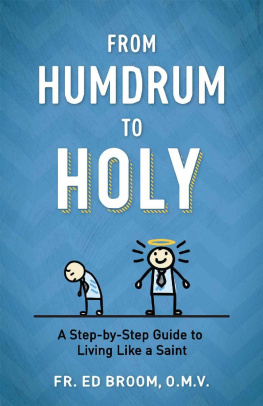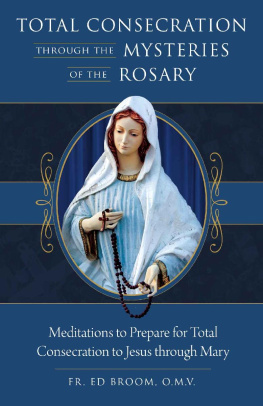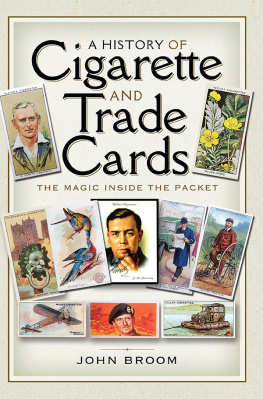Fr. Ed Broom - From Humdrum to Holy
Here you can read online Fr. Ed Broom - From Humdrum to Holy full text of the book (entire story) in english for free. Download pdf and epub, get meaning, cover and reviews about this ebook. year: 2016, publisher: Sophia Institute Press, genre: Religion. Description of the work, (preface) as well as reviews are available. Best literature library LitArk.com created for fans of good reading and offers a wide selection of genres:
Romance novel
Science fiction
Adventure
Detective
Science
History
Home and family
Prose
Art
Politics
Computer
Non-fiction
Religion
Business
Children
Humor
Choose a favorite category and find really read worthwhile books. Enjoy immersion in the world of imagination, feel the emotions of the characters or learn something new for yourself, make an fascinating discovery.
- Book:From Humdrum to Holy
- Author:
- Publisher:Sophia Institute Press
- Genre:
- Year:2016
- Rating:5 / 5
- Favourites:Add to favourites
- Your mark:
- 100
- 1
- 2
- 3
- 4
- 5
From Humdrum to Holy: summary, description and annotation
We offer to read an annotation, description, summary or preface (depends on what the author of the book "From Humdrum to Holy" wrote himself). If you haven't found the necessary information about the book — write in the comments, we will try to find it.
From Humdrum to Holy — read online for free the complete book (whole text) full work
Below is the text of the book, divided by pages. System saving the place of the last page read, allows you to conveniently read the book "From Humdrum to Holy" online for free, without having to search again every time where you left off. Put a bookmark, and you can go to the page where you finished reading at any time.
Font size:
Interval:
Bookmark:
Fr. Ed Broom, O.M.V.
From Humdrum to Holy
A Step-by-Step Guide
to Living Like a Saint
SOPHIA INSTITUTE PRESS
Manchester, New Hampshire
Copyright 2016 by the Oblates of the Virgin Mary
Printed in the United States of America
All rights reserved
Cover design by Perceptions Design Studio.
Unless otherwise specified, biblical references in this book are taken from the Catholic Edition of the Revised Standard Version of the Bible, copyright 1965, 1966 by the Division of Christian Education of the National Council of the Churches of Christ in the United States of America. Used by permission. All rights reserved.
Excerpts from the Catechism of the Catholic Church , second edition, 2000 by Libreria Editrice VaticanaUnited States Conference of Catholic Bishops, Washington, D.C. All rights reserved. Used with permission.
Quotes from English translations of papal encyclicals are from the Vatican website (w2.vatican.va) Libreria Editrice Vaticana. All rights reserved. Used with permission.
No part of this book may be reproduced, stored in a retrieval system, or transmitted in any form, or by any means, electronic, mechanical, photocopying, or otherwise, without the prior written permission of the publisher, except by a reviewer, who may quote brief passages in a review.
Sophia Institute Press
Box 5284, Manchester, NH 03108
1-800-888-9344
www.SophiaInstitute.com
Sophia Institute Press is a registered trademark of Sophia Institute.
Library of Congress Cataloging-in-Publication Data
Names: Broom, Ed.
Title: From humdrum to Holy : a step-by-step guide to living like a saint /
Fr. Ed Broom.
Description: Manchester, New Hampshire : Sophia Institute Press, 2016.
Identifiers: LCCN 2014023546 | ISBN 9781622821983 (pbk. : alk. paper) ePub ISBN 9781622821990
Subjects: LCSH: Ignatius, of Loyola, Saint, 1491-1556. Exercitia spiritualia.
| Spiritual exercises. | Spiritual life Catholic Church. |
Holiness Catholic Church. | Happiness Religious aspects Catholic Church.
Classification: LCC BX2179.L8 B768 2016 | DDC 248.3 dc23 LC record available at http://lccn.loc.gov/2014023546
Contents
About the Author:
Acknowledgments
I would like to thank most especially my mom and dad, Mr. and Mrs. C. E Broom Jr., for their love of God, love of family, love of the priesthood, and love for Jesus and Mary. I would also like to thank Sophia Institute Press for their time, dedication, and zeal in spreading Gods word using the most efficacious and modern means of evangelization.
Furthermore, I am greatly indebted to my congregation, the Oblates of the Virgin Mary, and our Founder, Venerable Bruno Lanteri. Thanks to my religious family, I have learned the profound prayer life that comes through the Spiritual Exercises of St. Ignatius of Loyola as well as the tender and filial love that Mary has for me and the whole world. My final prayer is that of the psalmist: Give thanks to the Lord for He is good; His mercy endures forever.
Building Holiness
Building Holiness
Why are we here in this world?
Too many people today are like archers shooting in the dark: bracing their arms, steadying their aim, and letting their arrow sail through the dark with no target in view. Others are like drivers speeding along the freeway, totally oblivious of their destination. It hasnt occurred to them to use a map or a GPS.
If you ask these individuals why we exist and what our purpose on earth is, youll likely get blank stares and confusion. As spiritual beings, we need to know where were going and why were going there. To find these answers, we must begin at the beginning.
Why do we exist? The best answer is found in the famous work Spiritual Exercises by St. Ignatius of Loyola, founder of the Jesuits. St. Ignatius offers the clearest and most complete answer: Man is created to praise, reverence, and serve God our Lord, and by this means to save his soul. St. Ignatius called this definition the Principle and Foundation of his Spiritual Exercises . In other words, he rightly claims that the entirety of our spiritual life is solidly constructed on this short but indispensable statement.
The Baltimore Catechism uses similar wording: God made me to know him, to love him, and to serve him in this life and to be happy with him forever in the next. This was one of the first catechetical truths I learned as a child. It has been seared into my mind, and it has influenced my decisions for more than fifty years. When you, too, meditate on and fully accept the Principle and Foundation, this concept will influence your thought processes and decision-making and will transform your actions into habits that will serve as a motivational force until you take your dying breath. Indeed, every person God has brought into this world as an act of his generous, self-giving love should have this motivational philosophy, which is part of what is known as Ignatian spirituality.
Since understanding this definition is so important to your spiritual journey, lets take some time and examine the details in both formulations.
- Man is created (God made me). God does not need us, in the sense that we perform some vital function that he couldnt take care of without us. He is infinitely powerful and totally self-sufficient. He has freely given us life for no other reason than that he simply loves us. What should be our response to this overwhelming and completely selfless love?
- To know him. Weve all heard the saying You are what you eat. This is indeed true. Even more importantly, however, you are what you think . Actions follow a thought process and a decision. Bad actions are preceded by bad thoughts; good actions are preceded by good thoughts. Jesus says that we can know a tree by the fruits it produces (Matt. 12:33). Your thoughts, therefore, ought to be of him.
- To praise him in word and deed. St. Augustine reminds us to be sure that our praising the Lord with our lips is not contradicted by the way we live.
- To reverence him. Our God is holy, actually thrice holy, as portrayed in the vision of the prophet Isaiah in the Temple (Isa. 6:3). Remember that Moses was told to take off his sandals as he stood before the Lords presence in the burning bush because he was standing on holy ground (Exod. 3:5). These are mere symbols of the thrice-holy God we encounter in the Blessed Sacrament, the real presence of Jesus: body, blood, soul, and divinity. Symbol becomes reality in that sublime moment during Mass that we call the Consecration, when man is called to reverence God as did the prophet Isaiah and the humble Moses. Jesus is really and truly present in the holy sacrifice of the Mass and is waiting for us to visit him in his earthly temple, the Blessed Sacrament. Let us reverence and adore him, Emmanuel, God with us (Matt. 1:23), in the Eucharist.
- To serve him. Our adoration and reverence for Jesus cannot limit itself to our contemplative life but must overflow to our active life. To borrow a phrase from the Ignatian tradition, we should be contemplatives in action. The wisdom of the Thomistic maxim applies here as well: What you have contemplated in the quiet of prayer, share with others. Better to shine on others than to be simply shone upon.
- And by this means to save our souls and be happy with him forever and not just our own souls. One important concept in Ignatian spirituality that helps us build a bridge between contemplation and action is the Call of the King. The eternal King, our Lord and Savior Jesus Christ, has a very ambitious spiritual enterprise: to conquer and save immortal souls for heaven for all eternity. The essence of true prayer is praising God but also loving what God loves most: the salvation of immortal souls. He calls us to cooperate with Him in this: that is the Call of the King.
Font size:
Interval:
Bookmark:
Similar books «From Humdrum to Holy»
Look at similar books to From Humdrum to Holy. We have selected literature similar in name and meaning in the hope of providing readers with more options to find new, interesting, not yet read works.
Discussion, reviews of the book From Humdrum to Holy and just readers' own opinions. Leave your comments, write what you think about the work, its meaning or the main characters. Specify what exactly you liked and what you didn't like, and why you think so.










